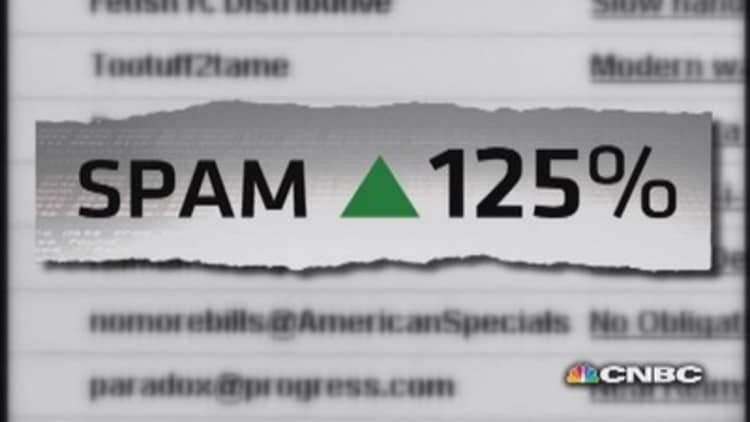
A new report from McAfee Labs confirms the cyberthreat is growing and evolving, with spam and malware reaching record levels last quarter. McAfee Labs released its third-quarter 2013 threat report on Wednesday.
"The industry must work harder to ensure the integrity of these [cyber] technologies given they are becoming more pervasive in every aspect of our daily lives," said Vincent Weafer, senior vice president of McAfee Labs, in a press release.
Consumers already get mountains of junk mail arriving at their homes daily and now their digital mailboxes are also getting deluged with spam. The number of spam messages increased 125 percent in the third quarter, according to McAfee. In September, spam levels were the highest they've been since 2010, with 4 trillion spam messages sent.
In the United States, you may receive many types of spam, including emails about bogus news and job openings as well as solicitation for pharmaceutical drugs.
The number of new malicious software, also known as malware, declined slightly in the third quarter, McAfee said. However, that's cold comfort given McAfee discovered 20 million new pieces of malware between June and the end of September. In total, McAfee has identified 172 pieces of malware, in what it calls its "zoo," a library of sorts for malware.
(Read more: With new malware, you have to pay to get your files back)
If you use an Android device, be on alert. McAfee said it found 700,000 new pieces of malware designed to attack Android users—up 30 percent from the prior quarter. The new malware includes banking Trojans that go after account information you may enter on your phone.
Threats against other mobile phone systems, including Apple's iOS, are insignificant, McAfee said, compared with the threats against Android.
McAfee's new threat report also warned about digital currencies, such as bitcoin, encouraging more regulation for the electronic monies.
(Read more: More bitcoins, more problems: How hackers are targeting bitcoins)
"As these currencies become further integrated into our global financial system, their stability and safety will require both financial monetary controls and oversight, and the security measures our industry provides." Weafer said.
Virtual currency grew to a $47.5 billion market in 2012 and is expected to rise 17 percent to $55.4 billion, in 2017, according to the Yankee Group.
While digital currencies are starting to be used by legitimate companies, like some Subway franchises and Virgin Galactic, they still help facilitate cybercrime. Unlike a traditional bank, virtual currencies are unregulated and allow criminals cover their tracks.
(Read more: Richard Branson: Buy your space flight with bitcoin)
Though there have been some notable shutdowns of digital currencies, such as the take down of Liberty Reserve in May. Yet, "Virtual currencies will not go away," the McAfee report said.
—By CNBC's Jennifer Schlesinger. Follow her on Twitter @jennyanne211.
For more of CNBC coverage of cybersecurity, visit HackingAmerica.cnbc.com.





